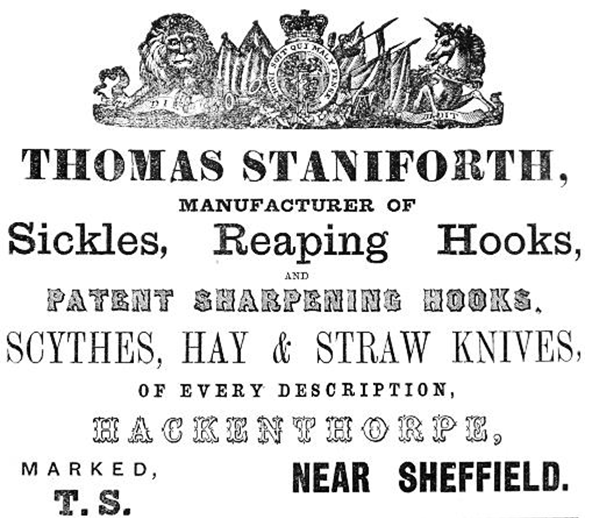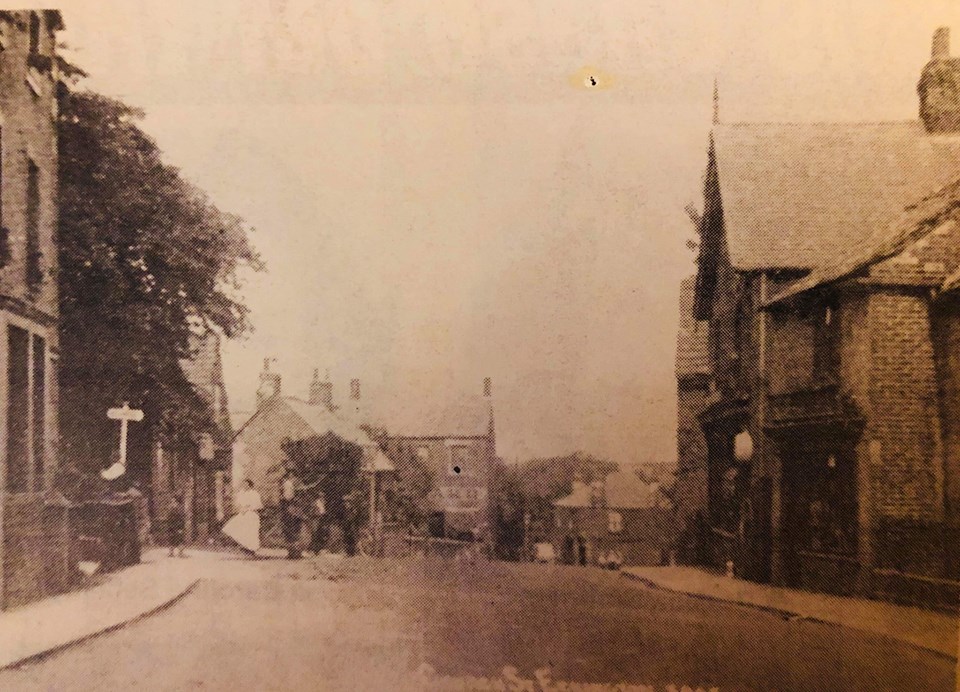
Thomas Staniforth & Co. Sickle works at Hackenthorpe.
 Eckington at the start of the 20th Century
Eckington at the start of the 20th Century
The following incident was reported in the Sheffield Independent on November 28, 1846.
Alarming Fire at Eckington
On Friday week, the inhabitants of Eckington were greatly alarmed by the breaking out of a fire on the premises of Mr. George Staniforth, a small farmer at that place. It appears that Mr. Staniforth's barn had been newly thatched, and only finished that afternoon. The wind blew very fresh all day. About three o'clock in the afternoon, one of the chimney's belonging to Mr. White's house, which is close by, caught fire, and blazed out very high. The sparks flew about fearfully, and unfortunately some of the burning flakes of soot fell upon the thatched roof of Mr. Staniforth's barn. The thatch, being new and dry, quickly ignited, and in a few minutes the whole roof was in flames. The alarm of "Fire" was quickly given, and numbers hastened to render assistance, and all were soon busily engaged in fetching water from the adjoining springs to quench the flames, but this was in vain, for the fire continued to rage fearfully, and the wind, which was blowing high at the time, added greatly to the fierceness of the flames. After the lapse of a short time, a small fire engine, which is kept at Renishaw Hall, the seat of Sir George Sitwell, had arrived, and was got to play upon the burning building as soon as possible. Owing to the bad supply of water, it was difficult to keep the engine in active work, although the people used every possible exertion to procure it far and near. It was soon found that the fire gained ground, and that all attempts to extinguish it with the means at hand were in vain. When the flames in the barn were at their heighest, it was discovered that two corn stacks at the end of the barn were in flames. The exertions of those present were then directed to these stacks, and a stack of hay adjoining.
In Spite of the exertions used to check the progress of the fury of the elements, the whole of the two corn stacks were soon one mass of flames, and the hay stack adjoining also took fire. It is impossible to describe the awful scene which presented itself, when the barn and the whole of the sticks were in flames. In about half an hour the roof of the barn fell in with a tremendous crash, and the flames rose in renewed strength. The engine was found to be so small as to be quite inadequate to check the further progress of the flames. The want of an engine of sufficient power to be brought into efficient use in cases of such emergency as this, was admitted and lamented by all present. Had there been a large one on the spot at the time when that from Renishaw arrived, there is every possibility that, with a proper supply of water, the flames would have been extinguished before extending further than the roof of the barn. About five O'clock, most of the stacks were consumed, and a most distressing scene presented itself.
The bystanders now had time to reflect on the alarm they had received, and the sympathy felt for the unfortunate sufferer was great. Too great praise cannot be given to those who took an active part during the time the fire was raging. The greatest activity, coupled with the utmost intrepidity, was displayed and it was gratifying to see the willingness with which all attended to the useful suggestions of others present, which is rarely the case at such times, every body acting according to his own views of what is right. In this instance, however, it was quite the reverse, for all readily, and with unison, acted upon the suggestions of some few gentlemen, at the head of whom were the Rev. E.B Estcourt, the Rev. A. Mozeley, curate of the parish, and Edward Humble Esq. who remained to the last, and made it their duty to superintend and assist in the working of the engine and the exertions made to extinguish the flames. The feeling with which all seemed to act was a desire to be of service. During the fire, a most impudent act of delony was committed. A Man named Joseph Marples, was seen to carry off three sheafs of barley belonging to Mr. Staniforth. He was watched home by a man who had seen him take the sheafs up, and on finding this he threatened to shout the party. Marples, two or three days afterwards, finding the robbery talked of in the village, took the barley back and begged pardon.
Steps have been taken to bring him before the Magistrates for this offence. The fire was got totally out at about seven O'clock, when it was thought it might be left in safety. Two men were appointed to watch during the night, in order that they might immediately give an alarm, should flames again break out. Several barrels of water were also left in readiness. When it is considered that this was in the midst of a populous village, with several houses, many having thatched roofs, closely adjoining, and stacks at only a short distance, it may be thought a mercy that the wind blew the flames and sparks directly into the fields adjoining, else it is impossible to calculate the destruction that must have ensued. It is to be hoped that this occurence of this lamentable and destructive fire, will arouse the inhabitants to the peril they are exposed by the dangerous practise of using thatch to farm buildings, particularly when, as in the neighbourhood, slates and tiles can readily and cheaply be procured. The numerous fires which have arisen from this dangerous practise are such as to call for its discontinuance. We would suggest to the inhabitants of Eckington, the propriety of getting up a subscription for the purpose of purchasing an efficient fire engine, which could be kept in some central place, so as to be of easy access incause of like emergency to this. If it was once fairly set about, we have no doubt of its complete success. At any rate we hope it will be tried. The farm buildings were and produce were, we regret to state, uninsured. The total loss by the fire is estimated at 120 to 150 pounds.
It is a right saying that misfortunes never come singly, and this was too truly the same with Mr. Staniforth. Among the small portion of the farming stock and implements saged, were a winnowing machine, a new cart and some corn. These were removed during the time the building was on fire, to the shed of a neighbouring farmer, and singular to relate, the machine was completely destroyed, and the cart and corn much injured two nights afterwards, by the roof of the shed falling in. Mr. Staniforth we understand, is an industrious, hard working man, and had saved the capital by which he commenced his farm out of his earnings as a laboring collier and carter. The occurence of this lamentable fire, but for the benevolence means taken to assist him, would have thrown him and his family again entirely dependent upon his own hard labour as a collier, On Monday, a meeting was held at the White Hart Inn, for the purpose of taking into consideration the desirability of raising a subscription, to compensate Mr. Staniforth for some portion of his loss, and we are gratified to state that the list was headed by the Rev. E. B Estcourt putting down his name for 10 pounds. The subscription has been liberally responded to by another parties, and has already reached between 40 and 50 pound.